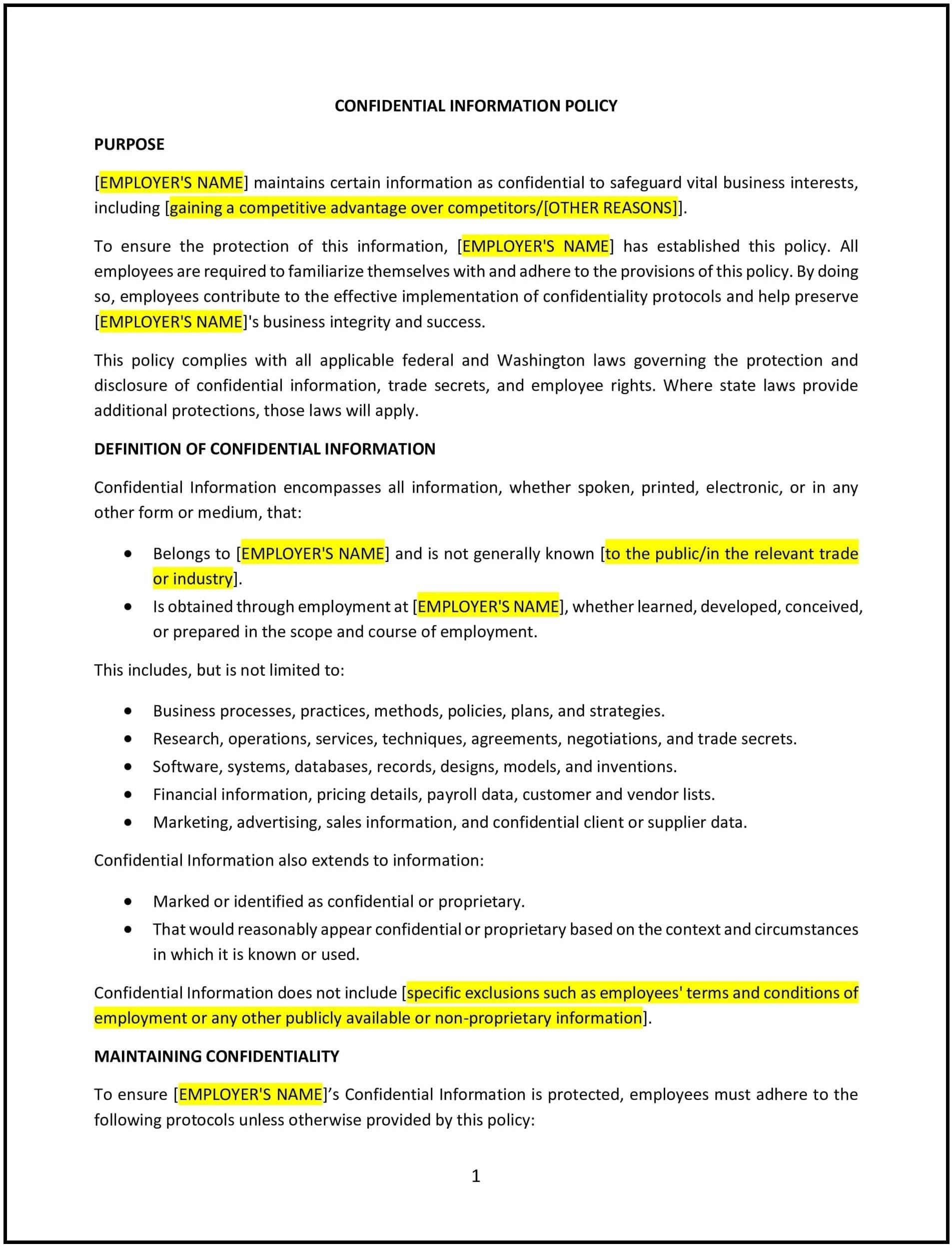Confidential information policy (Washington): Free template
Got contracts to review? While you're here for policies, let Cobrief make contract review effortless—start your free review now.

Customize this template for free
This confidential information policy is designed to help Washington businesses protect sensitive company information and ensure that employees understand their responsibilities regarding the handling, sharing, and protection of confidential information. The policy outlines what constitutes confidential information, the steps employees should take to safeguard it, and the consequences of disclosing or mishandling sensitive data.
By adopting this policy, businesses can safeguard their intellectual property, trade secrets, and proprietary information, while fostering a culture of trust and accountability.
How to use this confidential information policy (Washington)
- Define confidential information: Clearly outline what constitutes confidential information, including intellectual property, trade secrets, financial data, employee information, client information, and any other sensitive business-related data. The policy should specify whether certain types of information are always considered confidential or if confidentiality is determined on a case-by-case basis.
- Specify the responsibilities of employees: The policy should detail employees’ obligations to protect confidential information, including how to handle, store, and dispose of confidential data. It should emphasize the importance of securing physical and digital information, using encryption, and avoiding unauthorized access.
- Address disclosure of confidential information: Clarify under what circumstances employees are allowed to share confidential information and the proper channels through which information can be disclosed. The policy should include guidelines on sharing information with other departments, third parties, or during meetings.
- Implement confidentiality agreements: If necessary, require employees, contractors, or vendors to sign non-disclosure agreements (NDAs) to formalize their commitment to protecting confidential information. The policy should specify when these agreements are required.
- Set guidelines for remote work: With the rise of remote work, the policy should outline how employees can maintain the confidentiality of information while working remotely, including using secure networks, password protection, and data encryption.
- Address consequences for violating the policy: The policy should specify the potential consequences of violating confidentiality, which may include disciplinary actions, termination of employment, or legal action. Employees should be made aware of the severity of mishandling confidential information.
- Ensure compliance with Washington and federal laws: The policy must comply with Washington state laws regarding data protection and privacy, as well as any applicable federal regulations, such as the Health Insurance Portability and Accountability Act (HIPAA) or the General Data Protection Regulation (GDPR).
- Review and update regularly: Periodically review and update the policy to ensure it remains compliant with Washington state laws, federal regulations, and any changes in the company’s operations or data protection practices.
Benefits of using this confidential information policy (Washington)
This policy offers several benefits for Washington businesses:
- Protects sensitive company data: The policy helps safeguard confidential and proprietary information, reducing the risk of data breaches, leaks, or misuse.
- Enhances employee awareness: Employees will understand their responsibilities regarding the handling and protection of confidential information, which helps reduce human error and ensures data security.
- Reduces legal risks: The policy helps ensure compliance with Washington state laws and federal regulations, minimizing the risk of legal issues related to the mishandling of sensitive data.
- Strengthens company reputation: A company that effectively protects confidential information is viewed as trustworthy and professional, which enhances its reputation with clients, customers, and partners.
- Increases operational efficiency: By setting clear guidelines on how to manage and protect confidential information, businesses can streamline their data handling processes, ensuring that sensitive information is accessible only to authorized personnel.
- Encourages accountability: The policy promotes a culture of accountability by clearly defining the expectations for protecting confidential information and the consequences of non-compliance.
Tips for using this confidential information policy (Washington)
- Communicate the policy clearly: Ensure that all employees are aware of the policy and understand their responsibilities regarding confidential information. Include the policy in the employee handbook, review it during onboarding, and provide regular training sessions to reinforce key principles.
- Regularly audit information handling practices: Conduct audits of how confidential information is stored, accessed, and shared within the company to ensure compliance with the policy and identify any potential security gaps.
- Use secure methods for communication and storage: Employees should be trained to use secure methods for storing and transmitting confidential information, such as encrypted emails, secure file-sharing platforms, and password-protected systems.
- Monitor third-party access: If third parties, such as contractors or vendors, have access to confidential information, ensure that they sign confidentiality agreements and comply with company policies on information protection.
- Address breaches promptly: If a breach of confidentiality occurs, take immediate action to investigate the incident, mitigate any damage, and implement corrective measures to prevent future occurrences.
- Review and update regularly: Periodically review the policy to ensure it remains compliant with Washington state laws, federal regulations, and any changes in the company’s data protection practices. Regular updates will help maintain the policy’s effectiveness and relevance.